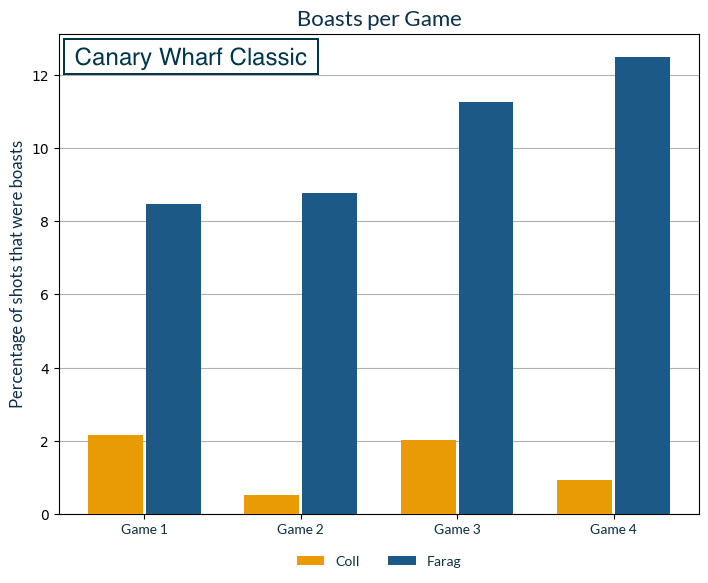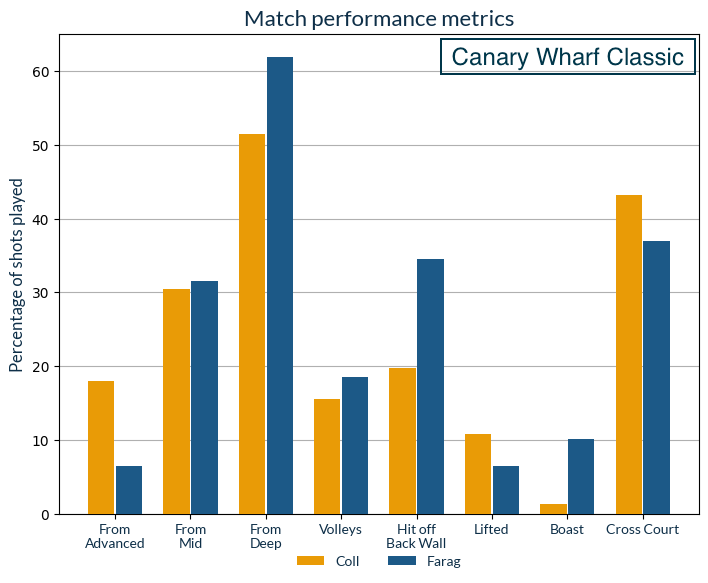Spot the difference
For the second time in three months, Paul Coll beat Ali Farag in four games on British soil. The Kiwi clearly likes it in the UK: the Channel VAS in 2016 was then the biggest win of his career; the British Open in 2021 his greatest achievement on court; the performance at Canary Wharf last week confirmed Coll as the World Number #2 in December’s rankings. And all under the careful gaze of his Birmingham-based coach Rob Owen.
The Kiwi’s victory over Farag at the British Open in August came as a surprise to many. Coll played immaculately, but some – unfairly – cited Farag’s court time in previous rounds (4 hours in total) as the deciding factor. Coll showed last week that this performance was not a fluke: he repeated the feat against an Ali Farag who had spent just 80 minutes on court on his way to the final.
Indeed, ‘repeated the feat’ seems appropriate. Viewers could have been forgiven for thinking – rowdy London crowd aside – that SquashTV were simply re-broadcasting the summer’s encounter in Hull. Like the British Open, Farag took the first game, and looked good for it. But then the Kiwi began to spin his web, successfully getting in front of Farag: in both Hull (left) and London (right), Farag matched Coll for position in Game 1, before the Kiwi took control of the court.
Coll pushed Farag so deep, so relentlessly, forcing the Egyptian to boast out of trouble time and time again. Last week (right), like in August (left), Farag hit a remarkable 1 in 10 shots on the boast; Coll, afforded more time and space, boasted just once every 50 shots. Sure, Farag twice found the nick expertly in Game 1, but that precision could never last.
Here, the rally patterns emerge. Coll’s length ensured the Farag boast. And that brought into play Coll’s drop shot – surely the biggest improvement in the Kiwi’s game over the past 18 months. In London, below, Coll hit 10 winners with the straight drop.
Coll hit 10 straight drop winners in the Canary Wharf Classic Final
These tactics were highly reminiscent of the British Open final, with one slight tweak. In Hull, Farag often reached the Coll drop – just – allowing Coll to hit over 80% of his winners from the front court, often to deep, as shown in the charts below. In London, Coll was so precise that he didn’t require the long drive to finish off the point. Same plan, same picture, different stats.
If it ain’t broke, don’t fix it. Coll hit 9 Unforced Errors in both Hull and London; 4.5 Winners per Game in London and 4.0 in Hull. In both, he took it short sparingly – once every 12 or 13 shots – but effectively. He volleyed every 6 shots, and used the back wall every 5. He slowed the game down every 8 or 9 shots, and turned Farag frequently, hitting cross court just under half the time. As seen below, Farag’s numbers in London (right) also showed remarkable similarity with his stats from Hull (left).
One difference between the two performances – and testament to how quickly Coll is able to implement new ideas – was the Kiwi’s ability to hold when playing forehand shots from mid-court, before finishing the rally with a cross court kill. In the Canary Wharf final he hit 30% of his Winners from this region of the court – in stark contrast to winning regions from Hull depicted above.
In London, Coll hit 30% of his winning shots from the mid-court forehand region - often with cross court kills
But despite this minor change, we did in many ways watch the same match 85 days apart. After all, on how many other occasions have we seen Farag, the undisputed master of court coverage, guess which way to move, or hang in the back corners? Against who else would Farag look to shorten the rallies? Unsuccessfully, mind: average rally length was high in both finals, around 20 shots per rally. The 144 shot rally to start Game 4 in London surely had Farag questioning his decision to request a newer, bouncier ball.
Coll won the first 3 points of Game 4 in London, including a 140-shot rally
But it was that decision by Farag to take a new ball, stunning Joey and PJ to silence in the commentary box, which spoke volumes: it was, perhaps, the act of a player who had simply tried everything else. Farag couldn’t push Coll physically or tactically; in both London and Hull, he was reduced to pushing Coll teasingly.
There is no greater indication of the impact coach Rob Owen has had on the Kiwi’s game. Watching Coll beat Farag – twice, now – was to watch one player who had mastered a strategy for winning points, and one player who had run out of ideas.











